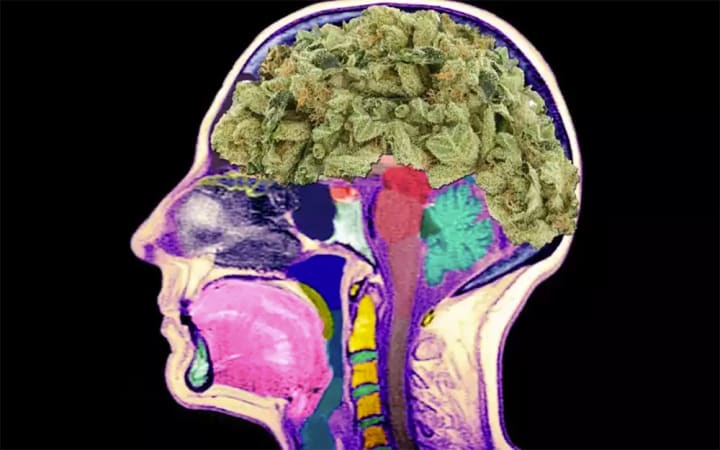
Does cannabis really enhance our senses?
Aside from a calm natural high, science tells us that cannabis can alter our 5 senses in amazing ways.
Your five senses change when you smoke, vape or ingest cannabis. Let's break that down for a second. Seasoned user or newbie, a small amount of cannabis can act like a couple glasses of wine after a stressful day. If we're calm and collected our thoughts and focus can lead to a meditative state and ultimately a light euphoria and more carefree thoughts and activities, which ultimately can improve our mental health, laughter, happiness and relationships.
Cannabis, also known as marijuana, has been used for centuries to enhance sensory experiences. This is because the active compounds in cannabis, called cannabinoids, interact with the endocannabinoid system in the body, affecting various functions, including sensory perception. Let's explore the science behind how cannabis can enhance our senses.
Smell
Cannabis contains terpenes, which are compounds responsible for the plant's distinct aroma. When consumed, these terpenes interact with the olfactory receptors in the nose, enhancing our sense of smell. This can result in a heightened appreciation of fragrances, food, and other scents.
Taste
Similar to how it affects the sense of smell, cannabis also affects taste perception. The interaction of terpenes with the taste buds on the tongue can enhance the taste of food and drinks. Many people report that their sense of taste becomes more acute and flavors are more intense when using cannabis.
Sight
Cannabis has been known to affect visual perception, causing the user to see colors more vividly and with greater intensity. This effect is often described as an "enhanced" or "trippy" visual experience. However, it is important to note that this effect can also cause visual distortions and increase the risk of accidents while driving or performing other tasks.
Touch
Cannabis can also affect our sense of touch by altering the perception of pain and physical sensations. This can lead to a more relaxed and comfortable physical experience, as well as an increased appreciation of touch-based sensations like massages and physical intimacy.
Hearing
Some people report that cannabis can enhance their musical experiences and amplify the sounds they hear. This may be due to the way that cannabis affects the brain, causing a heightened sensitivity to sounds. However, it is important to note that this effect can also lead to an increased risk of hearing damage, especially when listening to loud music or sounds.
Cannabis releases chemicals in the brain

All sensation originates from the brain. If you touch something really hot, you feel pain. The pain isn't really generated from your hand. Your hand sends a signal to your brain telling your brain that your hand hurts. The brain, then, creates the tactile sensation of pain, and relays it to your hand. Just like your eyes don't see. They take in visual stimuli, which is relayed through your optic nerves into your visual cortex, and, thus, interpreted as sight.
All of this happens because of neurotransmitters in the brain. Many chemicals can either speed up or slow down neurotransmitters so that sensations are augmented and enhanced. Cannabis is just one of many substances that can alter the way neurotransmitters relay information. Obviously, cannabis jumpstarts the transfer of dopamine, which results in a euphoric high. However, other neurotransmitters are released as well. These can have a whole number of affects on the body.

A Feeling of Relief
"Pain don't hurt", a classic line from the movie Roadhouse, has some grounding in reality when you consider that cannabis can actually muffle the neurotransmitters that cause us pain.
As mentioned before, pain is a product of the brain. Studies show that THC can affect the transfer of anandamide, a chemical in the brain responsible for regulating pain, as well as mood, hunger, and memory.
While cannabis won't make you indestructible, it can prevent you from feeling pain or at least. In some ways, this can be dangerous, because we as people need pain to warn us when we need to stop doing a thing. Some children born without pain receptors have been known to break their limbs and not notice because they feel nothing. Weed will not deafen your senses enough that you can walk on home with a broken leg and dislocated shoulder, but it will leave you feeling comfortably numb.
Enhance Your Sense of Taste and Smell

It's no secret that cannabis can give you the munchies. One of the biggest stereotypes about stoners is that they love to sit back and much on any food passed their way. However, there may be more to it than just cannabis making you hungry, which has proved to be very useful in cases where people experience a lack of appetite or full on eating disorder.
Consumption of cannabis jumpstarts production of the hormone ghrelin. Ghrelin has shown it's ability to help make us hungry. This in accordance with the release of dopamine combines to make food taste better which makes us happier to be eating. Doritos and Kraft dinner or a 5 star gourmet dinner. Studies have shown a large percentage of people experience some of all of these enhancements.

Cannabis has also been shown to affect blood pressure in positive ways, which ultimately increases our sense of touch and could even approve blood flow for better sex.
The eyes are no exception. All that blood flow to your eyes will dilate your pupils. This in turn results in more light entering your system, which makes the whole world appear brighter than it might normally appear. More vivid. More intense. The world will almost appear to radiate before you thanks to that, and grant you a literal brighter outlook on life. This also backs up how enhanced site and sound can make movies and music waaaaay more entertaining.

Speaking of our sense of smell...
Studies on animals show that THC affects their olfactory bulb, the part of the brain that allows you smell. One study put a bunch of mice in a labyrinth. Scientists place some cheese at the end of the maze. Half of the mice were given a dosage of THC, while the other half weren't. Those mice with THC in their system found the cheese faster than those without—assuming those without could find it at all. The cannabis mice had a stronger sense of smell than the normal mice.
Keep in mind that all of these changes are in so many ways connected. The alteration of neurotransmitters in the brain affects everything. Because certain neurotransmitters work overtime, the brain is able to take in and interpret external stimuli at a faster rate. In short, brain gets kick-started into sixth gear thanks to cannabis.
Hearing especially enhanced...

So it is apparent that cannabis affects the senses. However, there is one odd outlier: hearing. Many consumers of cannabis claim that they have superior hearing after taking cannabis, but it would appear that no major scientific studies clearly make the case for enhanced sense of hearing. We all react different on every level.
A study performed in 1976 tried to find a link between hearing and cannabis use. The test in this case tried to find a negative correlation by administering hearing tests. Half of the subjects consumed cannabis, while the other half were given placebos. All of them had preliminary hearing tests before consumption. Despite the scientists' preconceived prejudice against cannabis, they found that it had no negative or positive impact on any of the subject's ability to hear. Those on placebos performed on average just as well as those on cannabis. The scientists found no correlation.
Many people, however, claim to have an improved sense of hearing while on cannabis. Music sounding better than they ever had before. The truth is that these individuals do not have enhanced levels of hearing, but rather enhanced levels of dopamine. The dopamine in their system enhances not their hearing abilities but their reaction to audio stimuli. Their ears aren't any better. It's just they are in a different headspace listening to the things around them.
Hearing is the only sense apparently not impacted by cannabis. By all accounts, it's affects on the body are only just starting to be understood thanks to legal lab studies in recent years. Imagine what we might learn as more studies are performed to explore the positive effects cannabis and cannabinoids can have on the human body.
The trick like most things in life is moderation. Too much can take away from day to day clarity or create a psychological sense of necessity or lethargy, which is why depression has also been linked to cannabis. Moderation, moderation and more moderation!
Be well!
Sources:
https://nida.nih.gov/publications/drugs-brains-behavior-science-addiction/drugs-brain
https://thebrain.mcgill.ca/flash/i/i_03/i_03_m/i_03_m_par/i_03_m_par_cannabis.html
https://www.nature.com/articles/nn.3647
https://pubmed.ncbi.nlm.nih.gov/933252/
In conclusion, cannabis has been known to enhance various sensory experiences, including smell, taste, sight, touch, and hearing. These effects are due to the interaction of cannabinoids and terpenes with the endocannabinoid system in the body. While the effects of cannabis on sensory perception can be enjoyable, it is important to be mindful of potential risks and use it responsibly.

